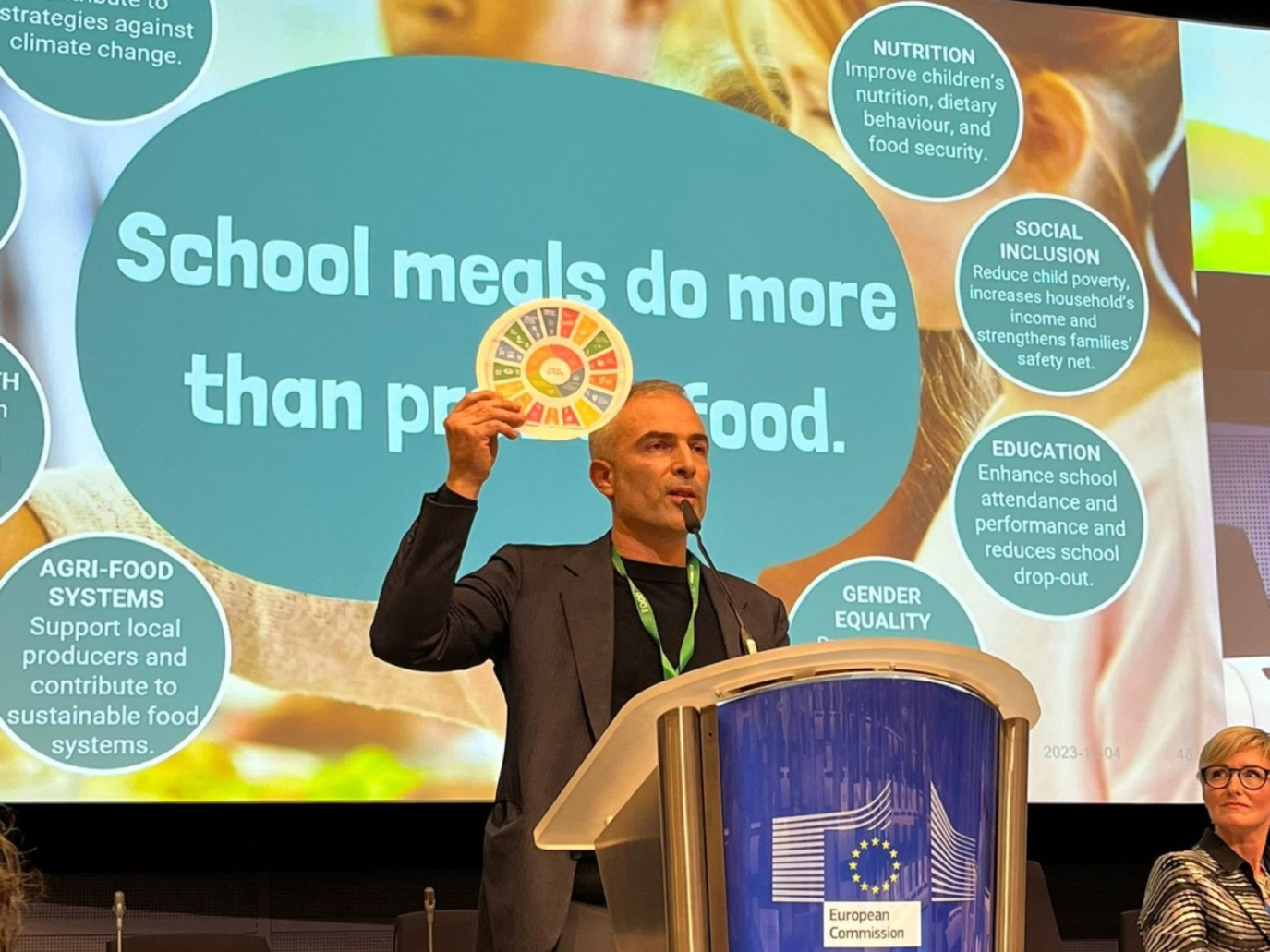There is a world of meanings and connections behind two simple words like "food" and "city," spanning across cultures, economies, stories, and social interactions. In urban contexts, food is an element of collective identity, a meeting point between tradition and innovation at the heart of drives such as globalisation and its opposites, like the return to short, local supply chains.
Dealing with food systems in cities ‒ meaning all those activities that are related to the production, processing, distribution, consumption, and post-consumption of food ‒ is critical also from an environmental point of view. According to the United Nations, by 2050 two out of three people will live in urban settlements, thus gobbling up 80% of food. In the major global metropolises, points out a study published by C40, Arup, and the University of Leeds, CO₂ emissions from food production and consumption made up 13% of the total in 2017. That is a release of 582 million tons of CO₂ equivalent into the atmosphere, which could grow by 40% by mid-century.
Thus, urban food policies, become fundamental tools of urban planning. However, how do we prevent food waste or support the demand for organic products without neglecting social sustainability, health, and the education of old and new generations? Renewable Matter spoke with Peter Defranceschi, Head Global of ICLEI and Global Coordinator of CityFood, about this. ICLEI - Local Governments for Sustainability is a global network working with more than 2,500 local and regional governments committed to driving local action towards a social-ecological transition, seeking to promote circular supply chains and low-carbon value chains.
Peter, what is CityFood?
City Food is our global food programme, one of the most relevant urban food policies. We work on three areas, all related to health: healthy people, healthy landscape, and healthy climate. This means dealing with encouraging changes in citizens' behaviours and habits.
Let's talk about extreme cases first. To what extent can mayors and local governments influence healthy eating in cities?
In some countries such as Italy, it is written in the Constitution that the mayor is responsible for the health of the community. However, if mayors say, “I want no pesticides in and around the cities, I don’t want too much junk food in cities, I don't want to see publicity around schools of unhealthy food” they cannot do much. There are always legal problems. For example, in the region of Italy where I am from, there is a village with many farmers who use a lot of pesticides. They had a referendum and 70% said they did not want the pesticides because, through rain and wind, they were transported everywhere, even in schools’ playgrounds. The mayor then prevented the spraying of those substances around the city, on municipal land. The mayor eventually received attacks from all sides and was ultimately defeated: he should not have held a referendum on health issues, nor should he have banned pesticides allowed by the European Union. At the same time in Germany, a mayor said, “I don't want single-use plastics in my city because I am responsible for the waste management”. McDonald's sued him, even though in the end it was the mayor who won. Still, it shows how difficult it is to intervene.
So what levers can be used?
Food, climate, and protein transition to a more plant-based diet have a lot to do with communication. If you propose to avoid meat someone might respond by saying, "I eat what I want.". However, if you suggest trying to eat more nonmeat traditional food, like parmigiana in Italy, it works better. It's more about communicating. In general, the shift towards protein and plant products has the greatest impact. It helps reduce greenhouse gas emissions and food waste.
Beyond communication, how can action be taken at the local level? Especially now that the Farm to Fork Strategy, which was initially a real pillar of the European Green Deal, is losing inertia.
There were lots of hopes when the strategy came out, it was the first time that the European Union adopted a sustainable food policy. For us, it is interesting because it calls for minimum mandatory standards on sustainable food procurement. So we developed the manifesto, Buy Better Food, with more than 50 organisations to discuss which areas to develop. Healthy food, animal welfare, organic or agroecological practices, which also have benefits for small farmers. We discussed what the goals and criteria might be, how to verify them, and how to enable them. This had a lot of impact. At the same time, it is interesting because the Strategy includes the revision of the EU's School Scheme, which provides for the distribution of fruits, vegetables, milk, and food education activities in schools.
However, the Strategy also called for achieving 25% of organically farmed land and the reduction of pesticides.
Unfortunately, this part was not delivered. There's still hope that with the revision of the new school scheme, something will come out. Farmers' protests, in addition to focusing on grain prices, lobby against pesticide reduction and for the maintenance of business as usual. Each time the big farmers and tractors come to Brussels, there is panic. There is a lack of vision. Currently, the big farming businesses are those driving the discourse. Over the last 20 years, 40% of small-scale farmers disappeared.
How to protect them?
We have a vision that there can be strong links between small farmers and cities through markets, direct marketing to procurement, linking them to food in schools, kindergartens, elderly homes, and hospitals. Since this is missing there is still hope. We think that food will be big on the agenda in the new Commission. However, during this term, unfortunately not much has been delivered.
Let's talk about procurement and commitment to education on nutrition: ICLEI is the lead partner of SchoolFood4Change, what is it about?
We discuss healthy food and focus extensively on food procurement. Our flagship project, "School Food for Change," has a significant impact. It is the largest project dedicated to sustainable food procurement and is genuinely making a difference. The project collaborates with 43 partners across 12 EU member states, emphasising the importance of impact for us. On one hand, it's about procurement. In Europe, local governments are responsible for issuing tenders and procuring food for educational institutions like kindergartens, schools, elementary schools, and high schools. The approach is very concrete. We advise them, and they commit to including specific criteria. For example, a certain percentage of the food on a plate must come from small-scale farmers, emphasising short food supply chains. Additionally, a designated percentage should be from organic agriculture, promoting healthy food linked to biodiversity and organic practices. Essentially, all the Sustainable Development Goals (SDGs) could be reflected on a single plate. Among other things, as part of the Buy Better Food campaign, we launched a petition calling for every child in Europe, in every school, to have a healthy meal and education on nutrition. We have collected almost 60,000 signatures and we want to promote it so that this Commission or the next one will commit to implementing it.
Hence, procurement is the first pillar of the project: what are the others?
The second pillar in "School Food for Change" is what we call the whole school food approach. Here, we don't just focus on feeding. It is not only about children getting their food, eating, and then going back to class. We consider what is happening around the school. Are there only fried foods and junk food available, or can you also find healthier options like an apple? We look at the relationships between children, parents, grandparents, and other family members, as well as the interaction with kitchen staff and the connection with local farmers. Cooking, for example, should be part of the school curriculum, because if students learn what healthy food is and cook it themselves, they will be interested in knowing where food comes from.
The third pillar concerns the menus and the chefs. How can we elevate the role of a canteen chef in a school? Often, being a canteen chef is not seen as the pinnacle of a culinary career. However, this role is incredibly important. Studies show that children who receive nutritious school meals perform better academically; they grow healthier and can concentrate better in class. This aspect of school food should be valued more.
In conclusion, Peter, I would like to ask you for some practical examples of food policy that deserve to be shared with our readers. What comes to mind?
Here in Brussels, Ghent has a very comprehensive, sustainable food policy. They apply a lot of this fairtrade principle, which is about supporting short food supply chains and making the distance between farmers and consumers in the city shorter by cutting out intermediaries and expenses. Directly from the farmer, you get good food at a good price. Yet, they link it also to many social and economic aspects. For instance, they have social restaurants where people who usually cannot afford to go out can have dinner or lunch at a better price. They also provide surplus food to people who have been unemployed for long periods.
A clear example of social sustainability. Instead, are there other ways to support short supply chains and local production?
For instance, Dordogne in France, is quite a strong example. In their case, public procurement aims to buy 100% organic and local products. They achieve this without spending additional money; it's about doing it in a smart way. A little less meat, fewer middlemen, and most importantly dividing the tender into several lots so that smaller suppliers can participate. There are many ways to make sure that in the end, the food that ends up on the plate is good. It is nutritious but doesn't cost more.
One last example, going back to the topic of food education?
In Slovakia, on the border with Ukraine, there is a school with 90% Romani children, so it is necessary to support healthy eating outside of school, however, there was no way to involve the parents because they did not participate in school activities. So they decided to start with the children, by telling them what healthy food is and what are the impacts of eating in an unhealthy way. And at the end, the children were asking the parents, “Why don't you give me nutritious food? Why don't you give me a salad? Why always cheap junk food or only meat or sausage?”. Over time, what happened is that the children educated the parents. It had quite an impact.
This article is also available in Italian / Questo articolo è disponibile anche in italiano
Images: ICLEI



